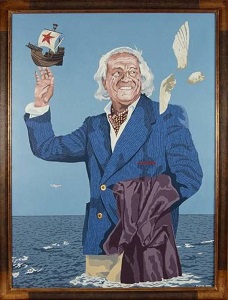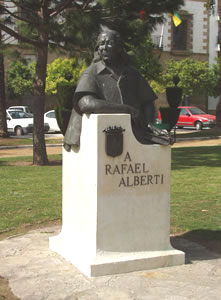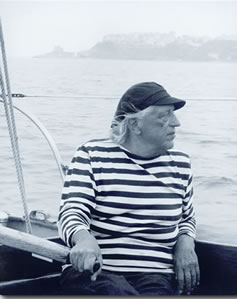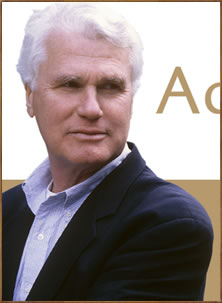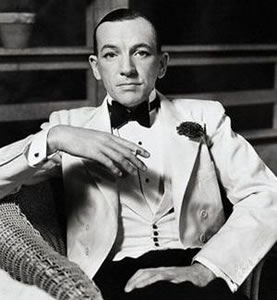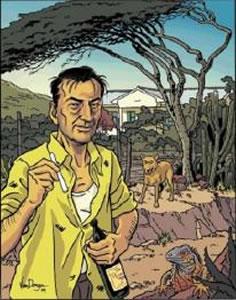De Spaanse dichter en schrijver Rafael Alberti werd geboren op 16 december 1902 in El Puerto de Santa María (Cádiz). Zie ook alle tags voor Rafael Alberti op dit blog.
De ogen van Picasso (Fragment)
Altijd een en al ogen,
onontkoombare ogen.
Met zijn ogen eet hij woorden.
Hij is een zevenoog.
Honderdduizend ogen in twee ogen.
De grote oogopslag.
als een donkere knop
en nog een knop.
Sleutelgaten waardoor hij
schilderijen ziet.
Je spert je ogen open
als hij je bijt met zijn ogen.
Het oog van de naald
met de draad die hij door een tekening haalt.
Hij nagelt je vast met zijn ogen
In één knippering van je ogen.
Oog dat loert,
aanvalt,
verschroeit,
onderzoekt.
Oog van liefde.
Oog dat waakt,
een schildwacht.
Spoor aan de laars,
een kaars,
rebellenoog dat openbaart.
Sluit ze niet, die ogen,
Sla ze niet neer die ogen.
Leg ze af, die ogen,
Ruk ze uit, die ogen
en je bent kreupel
of je bent mank.
Dan zet je jezelf weer in elkaar,
of je haalt jezelf uit elkaar,
je zet je neus af
en zet hem weer op,
zet hem nog eens af
en zet er twee op.
oog dat je aan het spit rijgt,
dat je pezen doorsnijdt,
dat je tepels doet rijzen,
dat je tepels doet verkleinen,
waarvan je een vuistslag kunt krijgen,
dat je billen doet zwellen,
je berooft van je billen,
je met een snoer omwikkelt.
je aan een draad rijgt,
je binnenstebuiten zal rukken
helemaal in stukken,
je zal ranselen, in elkaar zal drukken,
aan elkaar genaaid, vernietigd,
een lappendeken, vloeibaar.
het volmaakte en het overschot.
De wereld van rust
hing aan een draad.
Hij sneed hem door.
In die warrige kluwen,
een, chaotische klomp,
zette hij het scherp
van zijn mes, zijn penseel.
Vertaald door Alfonso Nypels
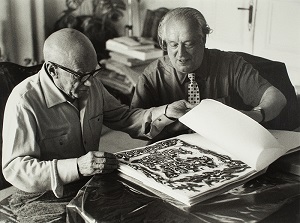
Rafael Alberti (16 december 1902 – 27 oktober 1999)
Hier met Pablo Picasso (links) in 1966
De Franse fabeldichter Pierre Lachambeaudie werd geboren op 16 december 1807 bij Sarlat. Zie ook alle tags voor Pierre Lachambeaudie op dit blog.
Le Somnambule
Obéissant aux caprices d’un rêve,
A minuit un homme se lève,
Et tout droit vers un gouffre il va sans tâtonner.
Le versant allait l’entratner,
Lorsqu’un ami du danger le retire.
Le Somnambule éveillé sur-le-champ,
«Que maudit soit, dit-il, le rustre, le méchant
Qui dissipe mon rêve au gracieux sourire!
Sans toi je parvenais aux portes du bonheur’… •
Bientôt de sa colère il comprit l’injustice,
Et d’actions de grâce il combla son sauveur.
Vous peuples, vous enfants, que l’erreur ou le vice
Berce d’un rêve dangereux,
Ne blàmez pas le père ou l’ami généreux
Dont la voix vous réveille au bord du précipice.
Pierre Lachambeaudie (16 december 1807 – 7 juli 1872)
Borstbeeld op Père-Lachaise, Parijs
De Britse schrijver en criticus (Victor Sawdon) V. S. Pritchett werd geboren op 16 december 1900 in Ipswich, Suffolk. Zie ook alle tags voor V. S. Pritchett op dit blog.
Uit: The Pritchett Century
“Since my boyhood I have been vain of being born just before the end of 1900 and at every birthday thinking of myself as pretty well as old as the century. I was at ease with its assumptions for fourteen years: after that, two dreadful wars, huge social changes, technological revolution, the disappearance of British power, the rise of the Welfare State, a decade or two of “peace” in the world abroad, dramatic threats once more.
Now I am eighty I see I have been shaken up like a dice in a box, if not as brutally as people born ten years earlier than myself. Many are still alive and in voice. I am abashed by my survival rather than proud of it; there is no merit in it. The credit goes to those secretive gamblers we call the genes.
I come of long-lived forebears among whom there were few defaulters on the Yorkshire side. Also, because of the great advances of medical science and hygiene, the average expectation of life in Great Britain has enormously increased in the past fifty years or more. The old are no longer revered curiosities; on the contrary, often a social problem. We swarm in cities and resorts, ancient mariners who square our shoulders as we pick one another out at a glance in the pubs, the shops, the park seats, the planes and the tourist buses. Our skins do not yet give off the eerie smell of senility. That glance of ours is often frisky, conspiratorial and threatening, warning you that we could a tale unfold if we should happen to get a grip on your wrist.
Not a day’s illness—we boast—except a winter cough or a twinge of arthritis or gout; we speak of these twitches as medals we have won. Smoke like fish (we go on), drink like a chimney, pity people who do not work a twelve-hour day, who have not ducked their heads through two world wars or known the good old hard times. And as for this new thing called sex …!
As our tongues wag and our metaphors mix we turn into actors on our conspicuous stage. We are good at pretending to be modest; we refuse to acknowledge we are ever in the wrong or incompetent. A brisk eighty-year-old electrician came to do a job at my house six years ago and serenely drove his drill clean through a hidden water pipe I had warned him of. He turned accusingly on me as the water spouted over us. Like all us oldies he congratulated himself and boasted he had never done such a thing to a water pipe. He and I still greet each other as we rush by in the street, equals in conceit and folly, and say how young we feel.”
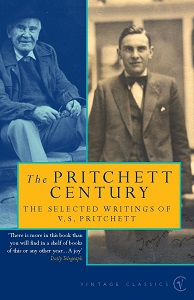
V.S. Pritchett ( 16 december 1900 – 20 maart 1997)
Cover
De Engelse schrijfster Mary Russell Mitford werd geboren op 16 december 1787 in Alresford, Hampshire. Zie alle tags voor Mary Russell Mitford op dit blog.
Uit: Our Village
“Then comes the village shop, like other village shops, multifarious as a bazaar: a repository for bread, shoes, tea, cheese, tape, ribands, and bacon; for everything, in short, except the one particular thing which you happen to want at the moment, and will be sure not to find. The people are civil and thriving, and frugal withal; they have let the upper part of their house to two young women (one of them is a pretty blue-eyed girl) who teach little children their A B C, and make caps and gowns for their mammas,—parcel schoolmistress, parcel mantua-maker. I believe they find adorning the body a more profitable vocation than adorning the mind.
Divided from the shop by a narrow yard, and opposite the shoemaker’s, is a habitation of whose inmates I shall say nothing. A cottage,—no, a miniature house, with many additions, little odds and ends of places, pantries, and what not; all angles, and of a charming in-and-outness; a little bricked court before one half, and a little flower-yard before the other; the walls, old and weather-stained, covered with hollyhocks, roses, honeysuckles, and a great apricot-tree; the casements full of geraniums (ah, there is our superb white cat peeping out from amongst them); the closets (our landlord has the assurance to call them rooms) full of contrivances and corner-cupboards; and the little garden behind full of common flowers,—tulips, pinks, larkspurs, peonies, stocks, and carnations,—with an arbor of privet, not unlike a sentry-box, where one lives in a delicious green light, and looks out on the gayest of all gay flower-beds. That house was built on purpose to show in what an exceeding small compass comfort may be packed. Well, I will loiter there no longer.
The next tenement is a place of importance,—the Rose inn; a whitewashed building, retired from the road behind its fine swinging sign, with a little bow-window room coming out on one side, and forming, with our stable on the other, a sort of open square, which is the constant resort of carts, wagons, and return chaises. There are two carts there now, and mine host is serving them with beer in his eternal red waistcoat. He is a thriving man and a portly, as his waistcoat attests, which has been twice let out within this twelvemonth.Our landlord has a stirring wife, a hopeful son, and a daughter, the belle of the village; not so pretty as the fair nymph of the shoe-shop, and far less elegant, but ten times as fine; all curl-papers in the morning, like a porcupine, all curls in the afternoon, like a poodle; with more flounces than curl-papers, and more lovers than curls. Miss Phœbe is fitter for town than country; and to do her justice, she has a consciousness of that fitness, and turns her steps townward as often as she can.”
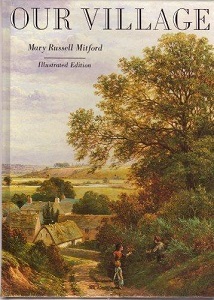
Mary Russell Mitford (16 dcember 1787 – 10 januari 1855)
Cover
De Braziliaanse dichter Olavo Bilac werd geboren op 16 december 1865 in Rio de Janeiro. Zie ook alle tags voor Olavo Bilac op dit blog.
Tercets
Still night it was, when first she said to me
Between two kisses that I could not stay,
And I, with tear-filled eyes, began to plea:
“At least please wait until the break of day!
Your room’s a fragrant nest, my heart is glad …
And see what darkness hovers out that way!
I low can you turn me out, alone and sad,
To wed the night and cold that’s in my breast
With that cold night with which the road is clad?!
Hear? it’s the wind! a storm! the sky’s distressed!
Don’t throw me out into the rain-swept gale!
Don’t ban me from your bed, let me find rest!
I´ll die of heartbreak and from yearning fail…
Oh wait! until the sun bursts forth, I pray,
Come warm me with your youth, I´m cold and pale!
And on your lap permit my head to lay
As once it did before you had complained …
Please wait a while! let night turn into day!”
—And she held out her arms. And I remained.
Vertaald door Frederic G. William
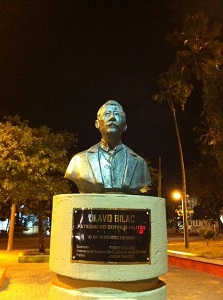
Olavo Bilac (16 december 1865 – 28 december 1918)
Borstbeeld in Recife

